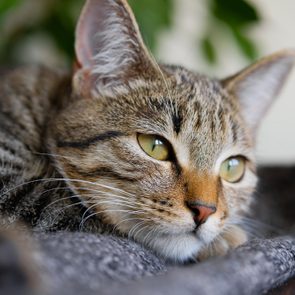Do Cats Like Baby Talk? The Answer May Surprise You.
Updated: Jan. 05, 2023

A recent study that reveals that cats pay attention to our baby talk.
Trying to get your cat’s attention? Ditch the catnip and try baby talk instead. Yes, you read that right: A recent study revealed that getting your pet’s attention is as simple as speaking with a high-pitched tone and extended vowels, just like how you’d communicate with a human baby.
Additionally, the study suggested that your cat can actually tell you apart from strangers. During the experiment, no amount of baby talk from a stranger could grab a cat’s attention—instead, the effect seems to be reserved for owners.
Human-directed vs. pet-directed speech
It’s pretty easy to tell when your cat is happy, but have you ever been curious if your pet can tell when you are, too? The study, published in the research journal Animal Cognition by French researchers Charlotte de Mouzon, Marine Gonthier and Gérard Leboucher, revealed that our cats may be more sensitive to our communications than imagined.
Here’s another fascinating insight this study suggested: Your cat can also discern between sounds you say to them and those you direct at another human being. So be mindful of the tone you use when talking to your pet—or they may accidentally think you’re talking to another human and zone out.
How do we know the cat baby talk response is real?
To get these results, de Mouzon and her team worked with 16 cats between the ages of 8 months and 2 years old. The pets belonged to students who attend the National Veterinary School in Alfort, France.
The team conducting research asked the owners to record themselves asking questions such as “Do you want to play?” or a pet favorite, “Do you want a treat?” They did so twice: Once in pet-directed speech, and once regularly as they’d talk to another human adult. Then, they asked 16 female strangers to record the same questions.
After this, the next phase of the experiment began. The researchers presented the cats with the recordings in their own homes. Their owners were also present but asked to not interact with their pets. Scientists used a rubric to grade the intensity of each cat’s reaction on a scale of zero to 20. The researchers then scored the pets based on their pupil dilation, if they turned their ears and if they paused motion or moved in the direction of the recording.
Recordings one, two, three and five played adult human-directed speech. The fourth recording, however, was that pet-directed baby talk speech. The study revealed that cats got less interested as each of the three recordings at the beginning played with the human-directed speech, but their attention made a significant rebound when the pet-directed speech was played. When the fifth recording of the human-directed speech played, the cats returned to their state of disinterest. Needless to say, these were some smart cats.
When researchers tried the same with a recording of a stranger, the cats were even disinterested when the pet-directed speech played. Scientists theorized that this could be because the pets were indoor animals and therefore didn’t have many opportunities to interact with people they were unfamiliar with.
Cats can be mysterious, and if you’ve ever wondered what your pet thinks of you, this cat baby talk study pretty much confirms what we’ve all hoped to be true. Cats are indeed highly attuned to their owners and see them as more than their catnip provider.
Source:
- Animal Cognition: “Discrimination of cat-directed speech from human-directed speech in a population of indoor companion cats (Felis catus)”





















